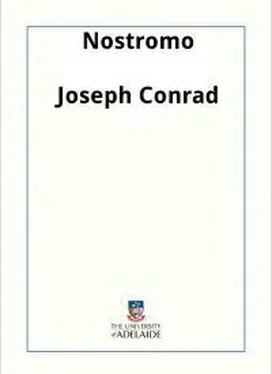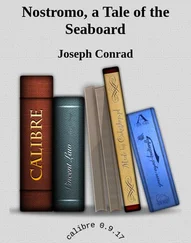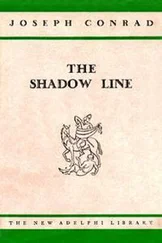Джозеф Конрад - Nostromo - A Tale of the Seaboard
Здесь есть возможность читать онлайн «Джозеф Конрад - Nostromo - A Tale of the Seaboard» весь текст электронной книги совершенно бесплатно (целиком полную версию без сокращений). В некоторых случаях можно слушать аудио, скачать через торрент в формате fb2 и присутствует краткое содержание. Год выпуска: 2006, Жанр: Классическая проза, на английском языке. Описание произведения, (предисловие) а так же отзывы посетителей доступны на портале библиотеки ЛибКат.
- Название:Nostromo: A Tale of the Seaboard
- Автор:
- Жанр:
- Год:2006
- ISBN:нет данных
- Рейтинг книги:4 / 5. Голосов: 1
-
Избранное:Добавить в избранное
- Отзывы:
-
Ваша оценка:
- 80
- 1
- 2
- 3
- 4
- 5
Nostromo: A Tale of the Seaboard: краткое содержание, описание и аннотация
Предлагаем к чтению аннотацию, описание, краткое содержание или предисловие (зависит от того, что написал сам автор книги «Nostromo: A Tale of the Seaboard»). Если вы не нашли необходимую информацию о книге — напишите в комментариях, мы постараемся отыскать её.
Nostromo: A Tale of the Seaboard — читать онлайн бесплатно полную книгу (весь текст) целиком
Ниже представлен текст книги, разбитый по страницам. Система сохранения места последней прочитанной страницы, позволяет с удобством читать онлайн бесплатно книгу «Nostromo: A Tale of the Seaboard», без необходимости каждый раз заново искать на чём Вы остановились. Поставьте закладку, и сможете в любой момент перейти на страницу, на которой закончили чтение.
Интервал:
Закладка:
“‘My name is known from one end of Sulaco to the other,’ he said, as quiet as the other. ‘What more can you do for me?’ That was all that passed on that occasion. Later, however, there was a very fine coasting schooner for sale, and Mrs. Gould and I put our heads together to get her bought and presented to him. It was done, but he paid all the price back within the next three years. Business was booming all along this seaboard, sir. Moreover, that man always succeeded in everything except in saving the silver. Poor Dona Antonia, fresh from her terrible experiences in the woods of Los Hatos, had an interview with him, too. Wanted to hear about Decoud: what they said, what they did, what they thought up to the last on that fatal night. Mrs. Gould told me his manner was perfect for quietness and sympathy. Miss Avellanos burst into tears only when he told her how Decoud had happened to say that his plan would be a glorious success. . . . And there’s no doubt, sir, that it is. It is a success.”
The cycle was about to close at last. And while the privileged passenger, shivering with the pleasant anticipations of his berth, forgot to ask himself, “What on earth Decoud’s plan could be?” Captain Mitchell was saying, “Sorry we must part so soon. Your intelligent interest made this a pleasant day to me. I shall see you now on board. You had a glimpse of the ‘Treasure House of the World.’ A very good name that.” And the coxswain’s voice at the door, announcing that the gig was ready, closed the cycle.
Nostromo had, indeed, found the lighter’s boat, which he had left on the Great Isabel with Decoud, floating empty far out in the gulf. He was then on the bridge of the first of Barrios’s transports, and within an hour’s steaming from Sulaco. Barrios, always delighted with a feat of daring and a good judge of courage, had taken a great liking to the Capataz. During the passage round the coast the General kept Nostromo near his person, addressing him frequently in that abrupt and boisterous manner which was the sign of his high favour.
Nostromo’s eyes were the first to catch, broad on the bow, the tiny, elusive dark speck, which, alone with the forms of the Three Isabels right ahead, appeared on the flat, shimmering emptiness of the gulf. There are times when no fact should be neglected as insignificant; a small boat so far from the land might have had some meaning worth finding out. At a nod of consent from Barrios the transport swept out of her course, passing near enough to ascertain that no one manned the little cockle-shell. It was merely a common small boat gone adrift with her oars in her. But Nostromo, to whose mind Decoud had been insistently present for days, had long before recognized with excitement the dinghy of the lighter.
There could be no question of stopping to pick up that thing. Every minute of time was momentous with the lives and futures of a whole town. The head of the leading ship, with the General on board, fell off to her course. Behind her, the fleet of transports, scattered haphazard over a mile or so in the offing, like the finish of an ocean race, pressed on, all black and smoking on the western sky.
“Mi General,” Nostromo’s voice rang out loud, but quiet, from behind a group of officers, “I should like to save that little boat. Por Dios, I know her. She belongs to my Company.”
“And, por Dios,” guffawed Barrios, in a noisy, good-humoured voice, “you belong to me. I am going to make you a captain of cavalry directly we get within sight of a horse again.”
“I can swim far better than I can ride, mi General,” cried Nostromo, pushing through to the rail with a set stare in his eyes. “Let me——”
“Let you? What a conceited fellow that is,” bantered the General, jovially, without even looking at him. “Let him go! Ha! ha! ha! He wants me to admit that we cannot take Sulaco without him! Ha! ha! ha! Would you like to swim off to her, my son?”
A tremendous shout from one end of the ship to the other stopped his guffaw. Nostromo had leaped overboard; and his black head bobbed up far away already from the ship. The General muttered an appalled “Cielo! Sinner that I am!” in a thunderstruck tone. One anxious glance was enough to show him that Nostromo was swimming with perfect ease; and then he thundered terribly, “No! no! We shall not stop to pick up this impertinent fellow. Let him drown—that mad Capataz.”
Nothing short of main force would have kept Nostromo from leaping overboard. That empty boat, coming out to meet him mysteriously, as if rowed by an invisible spectre, exercised the fascination of some sign, of some warning, seemed to answer in a startling and enigmatic way the persistent thought of a treasure and of a man’s fate. He would have leaped if there had been death in that half-mile of water. It was as smooth as a pond, and for some reason sharks are unknown in the Placid Gulf, though on the other side of the Punta Mala the coastline swarms with them.
The Capataz seized hold of the stern and blew with force. A queer, faint feeling had come over him while he swam. He had got rid of his boots and coat in the water. He hung on for a time, regaining his breath. In the distance the transports, more in a bunch now, held on straight for Sulaco, with their air of friendly contest, of nautical sport, of a regatta; and the united smoke of their funnels drove like a thin, sulphurous fogbank right over his head. It was his daring, his courage, his act that had set these ships in motion upon the sea, hurrying on to save the lives and fortunes of the Blancos, the taskmasters of the people; to save the San Tome mine; to save the children.
With a vigorous and skilful effort he clambered over the stern. The very boat! No doubt of it; no doubt whatever. It was the dinghy of the lighter No. 3—the dinghy left with Martin Decoud on the Great Isabel so that he should have some means to help himself if nothing could be done for him from the shore. And here she had come out to meet him empty and inexplicable. What had become of Decoud? The Capataz made a minute examination. He looked for some scratch, for some mark, for some sign. All he discovered was a brown stain on the gunwale abreast of the thwart. He bent his face over it and rubbed hard with his finger. Then he sat down in the stern sheets, passive, with his knees close together and legs aslant.
Streaming from head to foot, with his hair and whiskers hanging lank and dripping and a lustreless stare fixed upon the bottom boards, the Capataz of the Sulaco Cargadores resembled a drowned corpse come up from the bottom to idle away the sunset hour in a small boat. The excitement of his adventurous ride, the excitement of the return in time, of achievement, of success, all this excitement centred round the associated ideas of the great treasure and of the only other man who knew of its existence, had departed from him. To the very last moment he had been cudgelling his brains as to how he could manage to visit the Great Isabel without loss of time and undetected. For the idea of secrecy had come to be connected with the treasure so closely that even to Barrios himself he had refrained from mentioning the existence of Decoud and of the silver on the island. The letters he carried to the General, however, made brief mention of the loss of the lighter, as having its bearing upon the situation in Sulaco. In the circumstances, the one-eyed tiger-slayer, scenting battle from afar, had not wasted his time in making inquiries from the messenger. In fact, Barrios, talking with Nostromo, assumed that both Don Martin Decoud and the ingots of San Tome were lost together, and Nostromo, not questioned directly, had kept silent, under the influence of some indefinable form of resentment and distrust. Let Don Martin speak of everything with his own lips—was what he told himself mentally.
Читать дальшеИнтервал:
Закладка:
Похожие книги на «Nostromo: A Tale of the Seaboard»
Представляем Вашему вниманию похожие книги на «Nostromo: A Tale of the Seaboard» списком для выбора. Мы отобрали схожую по названию и смыслу литературу в надежде предоставить читателям больше вариантов отыскать новые, интересные, ещё непрочитанные произведения.
Обсуждение, отзывы о книге «Nostromo: A Tale of the Seaboard» и просто собственные мнения читателей. Оставьте ваши комментарии, напишите, что Вы думаете о произведении, его смысле или главных героях. Укажите что конкретно понравилось, а что нет, и почему Вы так считаете.












